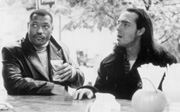VANITY PRODUCTIONS are a symptom of stardom. Bruce Willis hits big and gives us Hudson Hawk. Clint Eastwood began directing with Play Misty for Me. Then there’s the entire cinematic oeuvre of Prince. The record is mixed, but give credit to Laurence Fishburne for first writing, directing, and acting in the well-reviewed 1994 play Riff Raff, then leveraging his Matrix clout to produce this vital, gritty adaptation. Taking what was originally a no-frills, one-act, three-man stage production, he’s expanded the story with additional characters—of the violent, comical Tarantino variety—and partially succeeds in breaking out of the proscenium. Certainly Life is no eager-to-please panderer or simple ego exercise.
ONCE IN THE LIFE
written and directed by Laurence Fishburne with Laurence Fishburne, Titus Welliver, Eamonn Walker, and Annabella Sciorra opens November 17 at Uptown
Fishburne himself plays Mike, a charismatic but impulsive NYC hood who happens upon his lighter-skinned half-brother Torch (Titus Welliver) in jail. Uneasily reestablishing their acquaintance, sharing a father but seemingly not much more, the two skels decide to rip off a formidable drug dealer, but the scam goes bad. Three kids get killed and Torch has a few fingers shot off, so he and Mike repair to a hideout where they wait for the assistance of Mike’s old prison pal Tony (British actor Eamonn Walker of HBO’s Oz). Problem is, Tony works for the dealer and needs to kill the half-brothers to save his own family—a child and wife (Annabella Sciorra) held hostage by his boss.
Initially, Fishburne keeps the action out of the brothers’ refuge, using location shooting and hip-hop music for a brisk first act. The scuzzy criminal milieu is fun, and the low-lifes behave with enjoyable volatility. “You always in trouble,” Mike is told, and he’s to blame for bringing hair-trigger Torch into the robbery, but he’s also the one who tries to reestablish family feeling. “I told you not to call me that,” Torch snaps when Mike affectionately refers to him as “bro.” Once they’re contained within the de facto set of the last two acts, however, Fishburne’s dramatic conceit wears thin.
As the brothers bond, bicker, and reconcile, Tony struggles with his conscience (or “sub-conscience,” as Mike calls it). Fishburne goes overboard with lighting and set design, betraying his inexperience behind the camera, but keeps the production admirably focused on the actors and their words. However, the siblings’ basic familiarity doesn’t justify the big-screen treatment, and Tony’s prison doggerel poetry grows tedious (such declamation might work in the theater, but not in the multiplex). Having cooped up his three leads together, Fishburne can’t quite develop their characters to another level. Their doom, while expertly played, never transcends the room.








